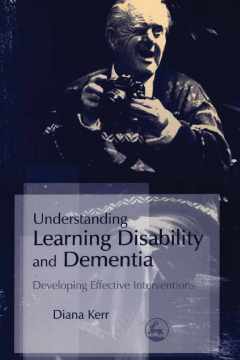
Additional Information
Book Details
Abstract
Understanding Learning Disability and Dementia covers all the essential issues in supporting a person with a learning disability when they develop dementia.
Like the population at large, people with learning disabilities are living longer, and therefore an increasing number are developing dementia. Service providers, planners, doctors, social workers, carers and direct support staff need to be equipped with relevant knowledge prior to the onset of dementia, so that they can devise appropriate therapeutic interventions and coping strategies, including health and medication management and palliative care.
This book will provide essential knowledge for anyone involved in the provision of services, assessment of need and direct care and support for dementia sufferers who also have a learning disability.
Diana Kerr has worked for many years as practitioner, educator, trainer and researcher in the fields of dementia and learning disability. She runs numerous courses on learning disability and dementia for voluntary, statutory and private providers, as well as for carers. She is currently a Research Fellow at the University of Edinburgh.
An examination of the issues which arise when a person with learning disabilities develops dementia. Aimed at professionals, planners and service providers.
BILD Newsletter
This book provides a good introduction to learning disabilities and dementia and will be of use to those working in dementia care as well as in learning disability services.
PMLD Link
The chapters are informative, well written and clearly structed, each with a summary paragraph so clinicians can decide if it's a relevant read...I really enjoyed this book. I learnt a great deal and am sure other clinicians new to this area will too.
Speech and Language Therapy in Practice
Diana Kerr's book defines learning disability and dementia and the relationship between the two, and examines the difficulties in reaching a diagnosis, especially in the early stages.
The book provides powerful information, illustrated by case studies, about the support needs of individual patients, and about the challenges that carers may face. The information is delivered in a practical but insightful manner. Chapters focus on communication, challenging behaviour, medication, pain and dealing with relatives, carers and the frequently overlooked group, a patient's peers. The book highlights models of care and how to support someone during the later, difficult stages of their condition.
Ms Kerr clearly has vast experience of working with people with a learning disability and those with dementia. This easy to understand book would make an excellent resource text for a community home staff team, NVQ student or a relative or carer of someone with this testing diagnosis.
Nursing Standard
Table of Contents
| Section Title | Page | Action | Price |
|---|---|---|---|
| Editorial | |||
| Barbara Evers | |||
| Gender relations and economic issues | |||
| Diane Elson | |||
| Structural adjustment - cure or curse? Immplications for Caribbean development | |||
| Peggy Antrobus | |||
| Changing from subsistence to cash cropping - Sakaramma's story | |||
| Rajamma G. | |||
| Gender, economic growth and poverty | |||
| Noeleen Heyzer | |||
| Struggles over patriarchal structural adjustment in Tanzania | |||
| Marjorie Mbilinyi | |||
| Filipino women demand freedom from debt | |||
| Judy Taguiwalo | |||
| Is liberalization damaging Albanian women's health | |||
| Chris Corrin | |||
| The other side of economic success - poverty, inequality and women in Chile | |||
| Stephanie Barrientos | |||
| Investment finance - off-limits for women | |||
| Christine Y. Chilangwa-N'gambi | |||
| NGOs and gender policy - some issues from the South Indian silk reeling industry | |||
| Linda Mayoux | |||
| Saptagram opens up windows of opportunity in Bangladesh | |||
| Tahera Yasmin | |||
| Empowerment through income generating projects | |||
| Rajamma G. | |||
| Through Western eyes - two poems | |||
| Bridget Walker | |||
| News from GADU | |||
| Sue Smith. |
